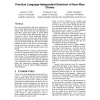Free Online Productivity Tools
i2Speak
i2Symbol
i2OCR
iTex2Img
iWeb2Print
iWeb2Shot
i2Type
iPdf2Split
iPdf2Merge
i2Bopomofo
i2Arabic
i2Style
i2Image
i2PDF
iLatex2Rtf
Sci2ools
CASCON
2004
2004
Practical language-independent detection of near-miss clones
Previous research shows that most software systems contain significant amounts of duplicated, or cloned, code. Some clones are exact duplicates of each other, while others differ in small details only. We designate these almost-perfect clones as "near-miss" clones. While technically difficult, detection of near-miss clones has many benefits, both academic and practical. Finding these clones can give us better insight into the way developers maintain and reuse code, and we can also parameterize and remove near-miss clones to reduce overall source code size and decrease system complexity. This paper presents a simple, general and practical way to detect near-miss clones, and summarizes the results of its application to two production websites. We use standard lexical comparison tools coupled with language-specific extractors to locate potential clones. Our approach separates code comparisons from code understanding, and makes the comparisons language independent. This makes it...
| Added | 30 Oct 2010 |
| Updated | 30 Oct 2010 |
| Type | Conference |
| Year | 2004 |
| Where | CASCON |
| Authors | James R. Cordy, Thomas R. Dean, Nikita Synytskyy |
Comments (0)

